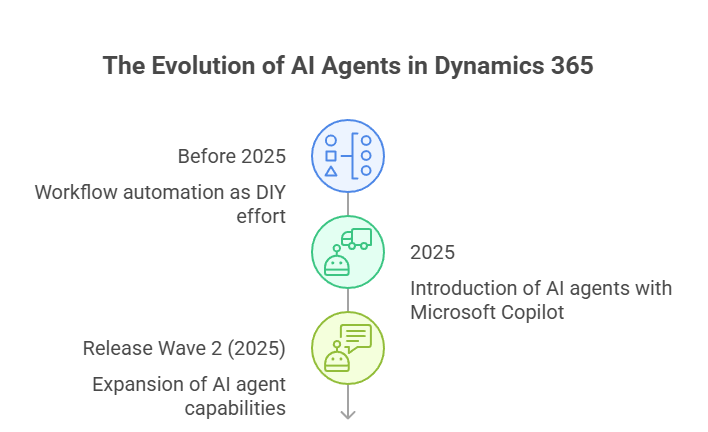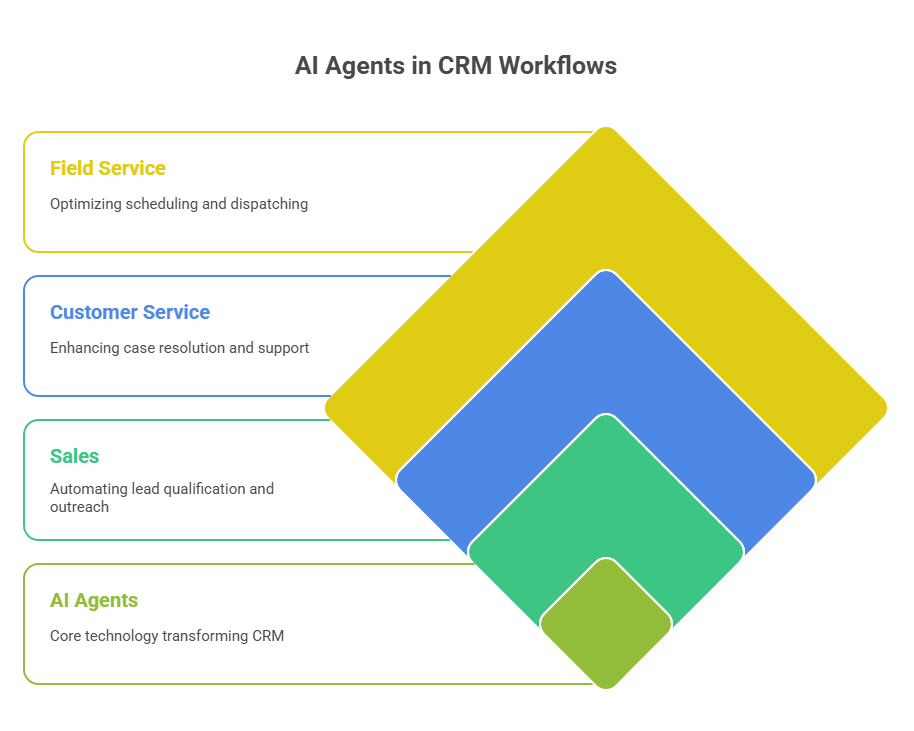Introduction
CRM workflows used to be built one logic step at a time.
Now, they’re starting to think for themselves.
With the 2025 Release Wave 2, Microsoft Dynamics 365 isn’t just improving automation — it’s redefining it. We’ve entered the age of agentic AI: smart, adaptive software agents that act on your behalf, make decisions, and coordinate CRM tasks without you manually building flowcharts or writing logic rules.
But what if you’re not ready for that leap?
That’s where we come in.
At Skywinds CRM, we help companies adopt the newest features in Dynamics 365 without breaking their workflows or burning time on trial and error. Whether you need to upgrade legacy systems or implement cutting-edge automation, our certified developers work as an extension of your team.
Module Customization — Tailor Sales, Marketing & Service to match your exact business logic.
Workflow Automation — Score leads, trigger follow-ups, and automate campaigns that feel human.
Dashboards & Reporting — Real-time KPIs and custom views for everyone from sales reps to execs.
Data Migration & Setup — Launch with clean, reliable CRM data from day one.
Business Tool Integration — Connect Outlook, Teams, Power BI, and more — with zero chaos.
Hire Dedicated Developers — Project-based or long-term — you choose the pace.
Let’s dive into how AI agents are transforming CRM workflows—and what it means for your business.
What Are AI Agents in Dynamics 365?

From Scripts to Smart Assistants
Before 2025, workflow automation in Dynamics 365 was largely a DIY effort. You’d map out triggers, actions, and conditions inside Power Automate, then cross your fingers that the logic held up over time.
Now, that model is fading.
With agentic AI, Microsoft introduces software agents that operate autonomously. These agents don’t just follow static instructions—they interpret goals, analyze context, and choose actions dynamically. They’re capable of reasoning, adapting, and collaborating with other agents or humans to complete tasks.
Think of it as going from a vending machine to a personal assistant.
Instead of saying “If X happens, then do Y,” you now have agents who understand that a sales lead opened your email and might need a follow-up, then act on it intelligently—without you lifting a finger.
Role of Microsoft Copilot and Release Wave 2
At the heart of this shift is Microsoft Copilot, which has evolved from a helpful AI assistant into the infrastructure for these agents.
In Release Wave 2 (2025), Dynamics 365 pushes this capability further with:
- Sales Qualification Agents that auto-research leads and draft emails
- Case Summary Agents that digest customer issues and recommend responses
- Scheduling Agents that optimize field service routes
- And more, depending on your app and module stack
These agents are powered by Microsoft’s new Model Context Protocol (MCP), which enables external AI models to participate in internal workflows—giving you access to custom logic, third-party AI, or vertical-specific automation.
For CRM teams, this isn’t just a new feature. It’s a new era.
How Agents Are Reshaping CRM Workflows

Sales – Lead Qualification on Autopilot
Before: Sales reps spent hours per week researching leads, prioritizing outreach, and crafting emails.
Now: AI agents do that in the background.
The Sales Qualification Agent in Dynamics 365 Sales is one of the headline features of Release Wave 2. It doesn’t just analyze a list—it reads LinkedIn profiles, reviews recent engagements, suggests follow-ups, and even drafts the outreach itself. Sales reps can focus on what they do best: closing.
It’s not just smart—it’s strategic.
Your team saves time, responds faster, and captures more qualified deals without building a single workflow rule.
Customer Service – Smarter, Faster Resolutions
In Customer Service, agents no longer have to dig through case histories or hunt for knowledge base articles.
Now, AI agents:
- Auto-generate case summaries from chat/email logs
- Recommend next steps based on case type and history
- Route tickets intelligently to the right agent
The result?
Less manual searching. More first-contact resolutions.
And support teams that actually enjoy the tools they use.
Field Service – AI That Schedules Itself
Field operations get a major upgrade in 2025. New scheduling agents don’t just assign work orders—they optimize field routes, predict maintenance needs, and reschedule tasks in real time based on traffic, weather, and resource availability.
One technician, one dashboard, and an agent that knows exactly where they should be next.
It’s dynamic dispatching without dispatcher overload.
Why This Revolutionizes Workflow Automation
Beyond Rules and Triggers
Traditional workflow automation in CRM tools was all about logic.
“If a lead is hot, assign it to John.”
“If an email isn’t opened, send a follow-up after 3 days.”
It worked—but only if the logic was perfect, the data was clean, and nothing changed.
With agentic AI, the logic is flexible.
You’re not writing static flows—you’re enabling agents to reason through scenarios.
They decide what action to take based on outcomes, not just inputs. That’s a monumental shift.
Workflow automation isn’t disappearing. It’s being absorbed into a smarter layer of decision-making.
This is the essence of agentic AI, where multiple specialized agents collaborate to complete workflows.
Source: TechRadar
Real Examples of Agentic Workflows
Imagine this chain:
- A lead downloads a whitepaper.
- An agent checks if it’s a new or returning contact.
- It cross-references job title, company size, and past behavior.
- It assigns a score, updates the CRM, and triggers an email with tailored content.
- If the lead opens the email, the agent alerts sales with a personalized next step.
No manual flows. No five-step Zapier chains.
Just one agent orchestrating the entire lifecycle.
Efficiency Gains with Real Results
According to internal Microsoft partner data and early user feedback, agent-driven automation can:
- Reduce manual CRM input by up to 60%
- Cut average response times in support by 40%
- Save 5–7 hours per week per rep
It’s not just about moving faster—it’s about removing friction from every step of your process.
Getting Your CRM Ready for AI Agents
Boost Your CRM Performance with an AI Agent
AI agents are only as smart as the CRM systems they run on. To make the most of Dynamics 365’s new agentic features, your CRM must be clean, connected, and ready to scale.
Here’s what matters most:
1. Data Readiness
Agents need accurate, complete, and up-to-date data to function properly. That means cleaning duplicates, capturing full sales and support activity, and ensuring the agent can access it all via APIs.
2. System Compatibility
Your CRM should be able to talk to AI agents smoothly. That includes:
- API-level integrations
- Aligned data formats
- Flexible customization
- Enough capacity to handle more data flow
3. Agent Training & Testing
Feed the agent a strong knowledge base, clear instructions, and test it with real-world prompts. Check for AI “hallucinations” by asking it questions you already know the answer to. Keep refining as you go.
Want expert help?
Skywinds CRM supports full-scale data cleanup, CRM setup, and third-party tool integration — giving you a rock-solid base for any AI deployment.
Don’t Just Automate—Orchestrate
Agentic AI Is the Future of CRM
AI in CRM is no longer just about automating routine tasks — it’s about enabling intelligent coordination across your entire customer journey.
With Dynamics 365’s agentic upgrades, your CRM isn’t just reacting to events. It’s thinking through them.
Agents don’t wait for a trigger. They:
- Anticipate customer behavior
- Recommend next steps
- Coordinate follow-ups between systems, reps, and support teams
It’s automation with judgment — a major step beyond traditional flow-based logic.
Workflows That Think and Evolve
The old model: Build a workflow once and hope it holds up.
The new model: Deploy agents that adapt, learn, and improve every week.
Your CRM becomes more than a system of record. It becomes a system of action — one that delivers outcomes, not just tasks.
FAQs
1. What are AI agents in Dynamics 365?
AI agents are intelligent assistants that act autonomously within Dynamics 365. They handle tasks like lead scoring, case routing, and scheduling by interpreting data, understanding intent, and coordinating workflows — without manual triggers.
2. How do AI agents improve workflow automation in Dynamics 365?
They go beyond static rules by dynamically choosing actions based on real-time context. This transforms CRM workflows from scripted sequences into smart, adaptive processes that require less maintenance.
3. Do I need clean data for AI agents to work in Dynamics 365?
Yes. Accurate, complete, and accessible data is critical. AI agents rely on clean CRM records to function properly and deliver meaningful insights or actions.
4. Can AI agents work with my existing CRM setup?
They can, as long as your CRM is API-compatible, scalable, and customizable. Skywinds CRM helps businesses integrate AI agents without breaking existing workflows.
5. How can I test and improve AI agent performance?
Start with clear prompts, provide relevant knowledge bases, and test the agent with known scenarios. Watch for hallucinations, refine its logic, and continuously monitor its accuracy.

